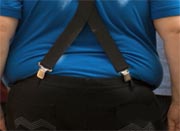
FRIDAY, Dec. 17 (HealthDay News) — The more obese a person is, the poorer his or her vitamin D status, a new study by a team of Norwegian researchers suggests.
The study found an inverse relationship between excess pounds and an insufficient amount of vitamin D, which is critical to cell health, calcium absorption and proper immune function. Vitamin D deficiency can raise the risk for bone deterioration and certain types of cancer.
The researchers also suggest that overweight and obese people may have problems processing the vitamin properly.
The team noted that after the so-called “sunshine vitamin” is initially absorbed (through either sun exposure or the consumption of such foods as oily fish and fortified milk), the body must then convert it into a usable form, called 1,25-dihydroxyvitamin D. This conversion process, however, seems to be short-circuited among obese people, complicating efforts to gauge their true vitamin D health.
The findings are published in the January issue of the Journal of Nutrition.
To investigate the impact of obesity on vitamin D absorption, the team spent six years tracking 1,464 women and 315 men, with an average age of 49. Based on the participants’ body mass index (BMI), an indicator of body fatness calculated from a persons weight and height, the average participant was deemed to be obese. About 11 percent were categorized as “morbidly obese.”
From the outset, overall vitamin D levels were found to be below the healthy range, the authors noted. By the end of the study, overall levels of vitamin D were found to have dropped off “significantly” while BMI readings rose by 5 percent.
The research team concluded that having a higher-than-normal weight, body fat and BMI was linked to a poorer vitamin D profile.
For example, people with the lowest BMI readings had 14 percent higher vitamin D levels than those with the highest BMI readings.
Because vitamin D levels did not correlate properly with 1,25-dihydroxyvitamin D levels (and in fact appeared to have an abnormal inverse relationship), the authors suggested that future efforts to explore vitamin D status among obese people should test for both measures of vitamin D health.
They also suggested that people who are overweight and obese might benefit from vitamin D supplementation and more exposure to sunlight.
More information
The U.S. Office of Dietary Supplements has more on vitamin D.

